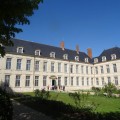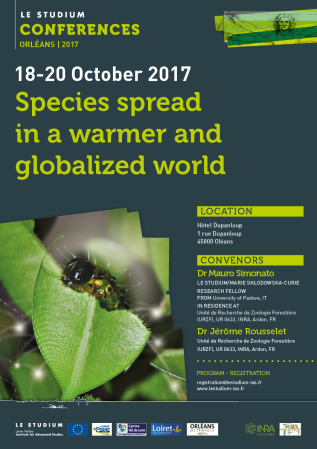Species spread in a warmer and globalized world
Hôtel Dupanloup
1 rue Dupanloup
45000 Orléans
France
Presentation
The world is experiencing several global changes interacting one with each other and affecting species distribution. In the last decades climate change has modified species distribution, bringing native species to expand or retract their range, and facilitating the establishment of alien species and biological invasions.
Globalization is increasing the risk of inter-continental transportation and introduction of alien species. Trade intensification can bring into contact different lineages of the expanding species coming from distant areas of the original distribution range, thus increasing their genetic variability and modifying their adaptive potential.
This process is also enhanced by anthropization of the landscape. In this context, ornamental plant trade plays a key role in pests and diseases spread. International plant trade is one of the main sources of biological invasions favoring the establishment of alien species and the spread of both native and invasive species. Moreover, ornamental trees are an increasing component of urban and suburban landscape and thus represent one of the main routes for the spreading of invasive insects and pathogens in new areas.
This international conference will foster discussion about the different aspects of climate-driven expansions and biological invasions, bringing together researchers with diverse scientific backgrounds ranging from population genetics to ecology.
Main Topics
The conference will cover topics on global changes and insect pest and disease introduction, establishment or spread in relation with: Climate change ; Global trade with a special focus on ornamental plant trade ; Landscape structure and land use changes ; Genetic markers for tracking species ; Genomics of adaptation to new environments ; Modeling of species spread ; Management of native or alien expanding species
Convenors
- Dr Mauro Simonato, LE STUDIUM / Marie Skłodowska-Curie Research Fellow.
FROM: University of Padova - IT
IN RESIDENCE AT: Unité de Recherche de Zoologie Forestière (URZF), UR 0633, INRA, Ardon - FR - Dr Jérôme Rousselet,
Unité de Recherche de Zoologie Forestière (URZF), UR 0633, INRA, Ardon - FR
Location
Hôtel Dupanloup : 1, rue Dupanloup - 45000 ORLEANS - FR
The conference venue is unique. Located right next to the Orléans’ cathedral, the episcopal palace of Orléans, built between 1635 and 1641, locally known as the Hôtel Dupanloup, is a classical French building which served until 1905 of residence to the bishops of Orléans. Since 2014, the renewed palace hosts the International University Center for Research and Le Studium Loire Valley Institute for Advanced Studies.
Participants will be welcomed in this exceptional surrounding, blending Middle Age and Renaissance cultures with modern design and will have the opportunity to discover French cuisine and wines.
PRACTICAL INFORMATIONS
PRICING
| Private institutions | 250 EUR |
| Public institution | 180 EUR |
| Students & PhD Scholars | 60 EUR |
| Social dinner | 60 EUR |
Confirmed Speakers
- Dr René Eschen, CABI - CH
- Dr Lorenzo Marini, University of Padova - IT
- Dr Andrew Liebhold, USDA Forest Service - US
- Dr Alberto Santini, IPSP Firenze - IT
- Dr Jean-Pierre Rossi, CBGP Montpellier - FR
- Dr Eric Lombaert, UMR ISA - FR
- Dr Christelle Robinet, URZF Orléans - FR
- Dr David Renault, University of Rennes - FR
- Dr Deepa Pureswaran, Laurentian Forestry Centre - CA
Scientific Committee
- Dr Andrea Battisti, University of Padova - IT
- Dr Carole Kerdelhué, DR2 INRA Montpellier - FR
- Dr Stig Larsson, Swedish University of Agricultural Sciences - SE
- Dr Alain Roques, Unité de Recherche de Zoologie Forestière (URZF) - FR
- Dr Jérôme Rousselet, Unité de Recherche de Zoologie Forestière (URZF) - FR
- Dr Mauro Simonato, University of Padova - IT
Oral presentations & posters
The submission of abstract for a talk is closed.
Please send your poster (or the abstract of your poster) to maurine.villiers@lestudium-ias.fr before the 02/10/2017. Please note that we do not print the posters, but racks & pins will be provided for up to A0 sizes.
Following the conference, participants will be encouraged to submit a paper to a special issue of Les Annales de la Société Entomologique de France on insect expansion (deadline: December 20th, 2017).
Programme
Wednesday October 18th 2017
- 12h30 Welcome lunch & registration
- 14h00 Official opening
- 14h10 H2020 funding opportunities, Marine Alalinarde(Cellule Mutualisée Europe Recherche - CMER)
- 14h30 Scientific opening
Drivers of biological invasions
Chairman : Dr Alain Roques
- 14h45 Dr Andrew Liebhold - Historical Drivers of Insect Invasions
- 15h15 Dr Alberto Santini - Factors affecting invasiveness: a view from Mediterranean countries.
- 15h45 Dr Lorenzo Marini - Human disturbance and rapid expansion of alien plants in a warming climate
- 16h15 Coffee break
Tracking invasion pathways
- 16h45 Dr Eric Lombaert - Reconstructing invasion routes from genetic data: methods and insights
- 17h15 Dr Natalia Kirichenko - Using historical herbarium collections to track back past distributions of invasive forest insect pests
- 17h45 Poster session
- 18h30 Dr René Eschen - Public Lecture in French - Insectes exotiques ravageurs: comment protéger nos forêts?
- 20h00 Wine & cheese cocktail
Thursday October 19th 2017
- 08h30 Welcome coffee
Phenotypic plasticity of invasive species
Chairman : Dr Carole Kerdelhué
- 09h00 Dr Eric Darrouzet - Chemical signature heterogeneity in the European inbreeded invasive hornet Vespa velutina nigrithorax
Patterns of insect dispersal
Chairman : Dr Carole Kerdelhué
- 09h30 Dr David Renault - Spatial sorting promotes dispersal capacities and environmental adaptations of invasive insects: the example of a carabid beetle invading subantarctic islands
- 10h00 Dr Mauro Simonato - Expansion patterns of pine processionary moth at the northern edge of its distributional range
- 10h30 Coffee break
- 11h00 Dr Christelle Robinet - Disentangling the role of active and human-mediated dispersal in the rapid spread of the invasive yellow-legged hornet, Vespa velutina
- 11h30 Audrey Bras - Rapid spread of the invasive box tree moth throughout Europe : assessing its flight performance and growth rate.
- 12h00 Lunch
Species interactions in a changing world
Chairman : Dr Natalia Kirichenko
- 14h00 Dr Deepa Pureswaran - Forest insect outbreak ecology in a changing climate
- 14h30 Dr Gaylord Desurmont - With or without you: effects of the concurrent range expansion of an herbivore and its natural enemy on native species interactions
Role of urban areas in insect pest dynamics
Chairman : Dr Jérôme Rousselet
- 15h00 Dr Jean-Pierre Rossi - The spatial distribution of trees outside forests and its impact on habitat connectivity for forest organisms
- 15h30 Dr Steve Frank - Urbanization transforms native herbivores into exotic pests
- 16h00 Coffee break
- 16h30 Kristi Backe - Pest insects on urban trees: How quickly do populations build up?
- 17h00 Marion Cordonnier - Biological invasions can be promoted by the interaction between urbanization and climate. A case study of the pavement ant Tetramorium sp. E
- 17h30 Poster session
- 18h00 Orleans sightseeing
- 20h00 Social dinner at Brasserie Eric Lecerf
Friday October 20th 2017
Endangered ecosystems and pest management
Chairman : Dr Mauro Simonato
- 08h30 Welcome coffee
- 09h00 Pr Andrea Battisti - Spread of the introduced biocontrol agent Torymus sinensis in northeastern Italy : dispersal through active flight of assisted by wind ?
- 09h30 Pr My Ahmed El Alaoui El Fels - Insect pests seeds and pods of some species of acacias in Morocco
- 10h00 Dr Denis Thiéry - Studying the foraging behaviour of the bee predator Vespa velutina, in order to develop bio-control methods
- 10h30 Coffee break
Future perspectives in biological invasions
- 11h00 Dr Alain Roques - Global change is triggering a much faster expansion of non-native insects established in Europe during the last decades
- 11h30 Scientific conclusions
- 12h00 Lunch bags









